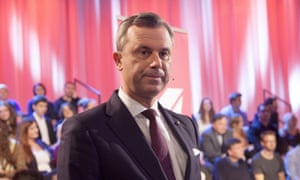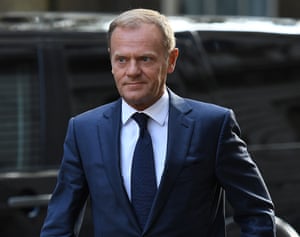Extract from The Guardian
In Italy and Austria
this weekend a shaken EU faces the first of a series of pivotal
electoral tests that could profoundly change the political landscape of
the bloc, and conceivably herald the end of the European project in its
current form.
Shortly before last May’s G7 meeting in Tokyo, Martin Selmayr, the senior Brussels official who runs the cabinet of the European commission president, Jean-Claude Juncker, tweeted what he described as his populist “horror scenario”.
Imagine, he said, if instead of Barack Obama, François Hollande, David Cameron and Matteo Renzi, next year’s summit were to feature Donald Trump, Marine Le Pen, Boris Johnson and Beppe Grillo.
Selmayr was right about Trump, now the US president-elect. He was half-right about Johnson, who missed out on the job of prime minister after Cameron resigned following Britain’s Brexit vote, but did become foreign secretary.
If he proves right on the rest, Europe will be in serious trouble.
The angry, anti-establishment, nation-first tide that voted to sweep the UK out of the EU and Trump into the White House – in what the billionaire property developer himself called a “Brexit plus, plus, plus” – is rising steadily across the continent.
It is still far from certain to carry all before it. But over the next 12 months, EU member states face a dozen referendums and parliamentary and presidential elections, many contested by populist, Eurosceptic parties whose members believe that what happened in the UK and the US can now happen in Europe.
The French prime minister, Manuel Valls, has said “Europe could die” in the face of “attacks from the populists”. German’s doughty finance minister, Wolfgang Schäuble, has warned of the scourge of “demagogic populism”, while the EU’s economic affairs commissioner, Pierre Moscovici, suggested Europe’s voters might be poised “to destroy it”.
The first two tests will be on Sunday. In Austria, voters elect a new president after their first attempt was annulled. In a race currently too close to call, Norbert Hofer, of the anti-immigration Freedom party, could become the first freely elected far-right head of state in western Europe since the second world war.

Shortly before last May’s G7 meeting in Tokyo, Martin Selmayr, the senior Brussels official who runs the cabinet of the European commission president, Jean-Claude Juncker, tweeted what he described as his populist “horror scenario”.
Imagine, he said, if instead of Barack Obama, François Hollande, David Cameron and Matteo Renzi, next year’s summit were to feature Donald Trump, Marine Le Pen, Boris Johnson and Beppe Grillo.
Selmayr was right about Trump, now the US president-elect. He was half-right about Johnson, who missed out on the job of prime minister after Cameron resigned following Britain’s Brexit vote, but did become foreign secretary.
If he proves right on the rest, Europe will be in serious trouble.
The angry, anti-establishment, nation-first tide that voted to sweep the UK out of the EU and Trump into the White House – in what the billionaire property developer himself called a “Brexit plus, plus, plus” – is rising steadily across the continent.
It is still far from certain to carry all before it. But over the next 12 months, EU member states face a dozen referendums and parliamentary and presidential elections, many contested by populist, Eurosceptic parties whose members believe that what happened in the UK and the US can now happen in Europe.
The French prime minister, Manuel Valls, has said “Europe could die” in the face of “attacks from the populists”. German’s doughty finance minister, Wolfgang Schäuble, has warned of the scourge of “demagogic populism”, while the EU’s economic affairs commissioner, Pierre Moscovici, suggested Europe’s voters might be poised “to destroy it”.
The first two tests will be on Sunday. In Austria, voters elect a new president after their first attempt was annulled. In a race currently too close to call, Norbert Hofer, of the anti-immigration Freedom party, could become the first freely elected far-right head of state in western Europe since the second world war.

On the same day, Italians vote in a referendum on constitutional reforms on which Renzi has staked his political future. Polls have suggested the prime minister will lose – potentially bringing Grillo’s fiercely anti-establishment Five Star Movement a step closer to power.
The Netherlands goes to the polls on 15 March. There, Geert Wilders and his Eurosceptic, anti-Islam Freedom party is tied in the polls with the prime minister, Mark Rutte’s liberal VVD.
Italy’s referendum: five things you need to know
In France, the first round of presidential elections is on 23 April. The leader of the far-right, anti-European Front National, Marine Le Pen, is expected to advance from this to the runoff stage the following month.
And in the Czech Republic in October, the populists of ANO 2011, the Action of Dissatisfied Citizens, are forecast to win in the general elections.
Simon Tilford, of the Centre for European Reform thinktank, said the two big flashpoints for the union would be Italy’s constitutional referendum and France’s presidential election.
“In Italy, if Renzi loses the referendum, can’t survive, and elections then return a government committed to a referendum on taking [the country] out of the euro … that could produce a real standoff,” Tilford said.
“And in France, if Le Pen should win ... We don’t know what would happen, but she’s talked of a referendum on the euro, and on France’s EU membership. A strongly Eurosceptic government in France would mean a full-blown crisis in Europe.”
All this is by no means certain, of course. The populists’ confidence could be misplaced. All were quick to welcome the Brexit vote and Trump’s victory as events that, in Le Pen’s words, “made possible what was considered impossible”.
But in such uncertain times, voters could opt for continuity and stability: polls show support for the EU has surged since Britain voted to leave, and polling since the US election suggests no immediate “Trump bounce” for the Eurosceptics.
A victory in Austria by Hofer, the candidate from a party founded by a former SS officer, would be a huge symbolic blow for Europe and could presage worse in parliamentary elections to follow in 2018. Some, however, argue that its actual consequences may be limited: the presidential role is largely ceremonial.
In Italy, Renzi could cling on, or be replaced by a technocratic government committed to continuing steady, incremental reform. And if snap elections do follow, Italy’s electoral system does not necessarily make it easy for a single party to gain a majority in both houses of parliament.

In France, every poll so far has predicted Le Pen will lose heavily in the second round to a more centrist rival, who, on current form, is likely to be the conservative François Fillon. In the Netherlands, even if his toxic party emerges as the largest, Wilders is unlikely to be able to form a majority.
But regardless of the electoral outcomes, Europe’s upstarts will still shape the debate. Analysts point to the enormous influence exercised by the former Ukip leader, Nigel Farage, even though he was never elected to Westminster, and how mainstream, centrist parties, particularly on the right, have been pulled inexorably to the more radical edge in the Netherlands and France.
Mainstream leaders such as Merkel or Fillon would find themselves weakened, heading countries arguably more deeply divided than at any time in the postwar era, and struggling to push through their programmes.
For the European project itself, its confidence knocked by Brexit, the upcoming Trump presidency, a continuing migrant crisis, the terrorism threat, an agonisingly slow return to strong economic growth and the gathering Eurosceptic backlash, the consequences could be serious.

Faced with a more pressing need than ever to “get our act together, bring back a sense of direction, confidence, order” – as the European council president, Donald Tusk, put it – the bloc may find itself less able than ever to actually do so.
Its instinct, certainly, will be to pull together and maintain unity at all costs – not, from the UK’s perspective, a good sign for productive Brexit negotiations – and move forward forcefully where it can.
The head of the European Central Bank, Mario Draghi, said the bloc’s challenge must be to provide “outcomes that are both more efficient, and more directly aimed at the people, their needs and their fears – not towards institution-building”.
Trump’s apparent fondness for the Russian president, Vladimir Putin, along with his suggestion that US support for Nato – the security umbrella that for 60 years has made European stability and prosperity possible – may not be unconditional, has already prompted progress in one area.
A Franco-German defence and security initiative launched in September has gained fresh impetus, with foreign and defence ministers agreeing concrete steps to bolster the bloc’s capacity to respond to conflicts and crises on its borders. The influential German MEP Manfred Weber said Trump “will force Europe to grow up”.
Beyond security, analysts say, the union’s most pressing priority must be economic recovery, wage growth, the return of some sense of wellbeing. “Not that the whole anti-European backlash is solely attributable to that,” said Tilford. “But the poor performance of the EU economy is a very big factor.”
In fact, said Gianni Pittella, the leader of the European parliament’s Socialist group, Brexit and Trump had created a “huge opportunity” for strong, pragmatic EU initiatives.
Will they happen? Will Europe advance, or crumble? The coming months and years will be critical. If anti-Europeans win national elections and the EU fails to rise to the nation-first challenge, it will struggle to survive in its present form.
Few think it will break up entirely. But its ambitions may shrink; it could become more of commercial association than a 60-year-old, overarching political project. A hard eurozone core may ultimately emerge, with satellite “associate” members.
Some, including in Britain, would regard that as a good thing. But according to Mark Leonard, of the European Council on Foreign Relations, in a less open world of trade barriers and anti-migrant walls, where solidarity among old allies must pass a cost-benefit analysis, they should be careful what they wish for.
Ultimately, Leonard said in an article for Social Europe, “even Europe’s most Trump-like leaders will find it harder to defend their national interest if they try to go it alone. To survive in Trump’s world, they should try to make Europe great again.”

No comments:
Post a Comment